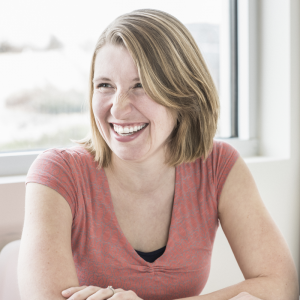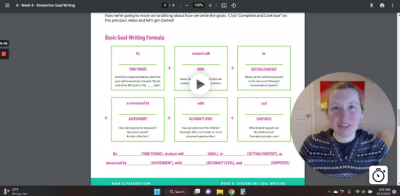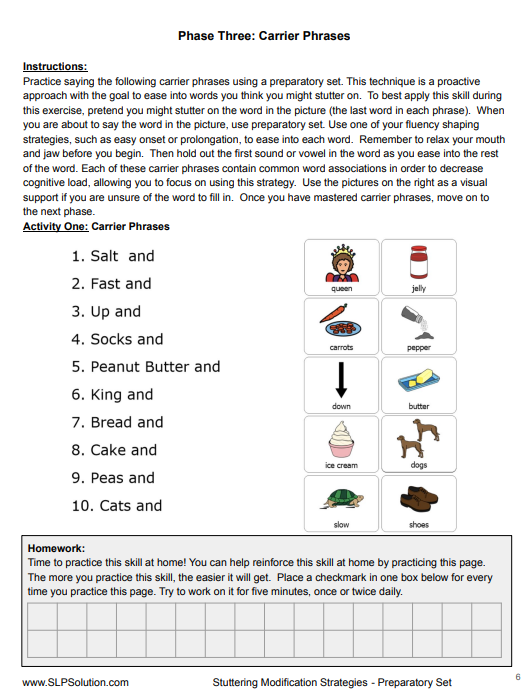SLP Work Settings:
How to Transition from One Job to Another
Are you an SLP that’s considering switching to a different setting? How do you know which setting will be best for you and if you’re ready to make that leap? Autumn Bryant from Expand Your Scope joined us to chat about 5 things you can do to help ease the transition to finding a new job or work setting.
- Expand Your Scope Site: www.expandyourscope.com
- Expand Your Scope Facebook Group: https://www.facebook.com/groups/expandyourscope/
If you’d rather listen to the audio version of the Speechie Show, click here:
Or if you prefer to read the transcript, see below:
Welcome to the Speechie Show! Being a speech language pathologist often means having too much work and not enough planning time. To beat the overwhelm, we’re bringing you the tricks and tools that will make your job a little bit easier.
Carrie: Welcome to the Speechie Show! I’m here today with Autumn Bryant from expandyourscope.com. How are you today Autumn?
Autumn: Good, how are you?
Carrie: I’m doing wonderful! We are here to talk to you today about what to do if you’re considering a different setting for your speech and language pathology job. We are blessed in our field to have a lot of different options when it comes to what kind of setting we can work in. But that often makes it a little intimidating when you’re thinking about switching jobs or considering a different setting. It’s hard to know if it will be right for you. So, Autumn is here today to help us talk about that. And while we do our introductions, go ahead and type into the questions box, or the comments, I’m sorry, type into the comments what your current setting is. We’d like to see where everyone is at because that will help us guide our discussion today. So, if you’re new to the show, my name is Carrie Clark. I am from speechandlanguagekids.com, and this is the Speechie Show. Every week I interview a new speech language pathologist and we talk about one topic, share five quick tips and then we give you a giveaway, and some fun resources at the end. So, stay tuned for that. Autumn, why don’t you go ahead and tell our listeners a little bit about you if they’re unfamiliar with you.
Autumn: So I’ve been a speech language pathologist for nine years now, but I spent most of my career in the school setting, in the same district from the time that I graduated. But I worked in a lot of different schools within that. So, I worked in about half of the schools in the district within the course of my time there. So, different age ranges all the way from pre-school to junior high and then in the summers I also worked in special needs schools with children with more intense needs. And then about a year ago, I transitioned to working with a pediatric outpatient clinic.
Carrie: Ok. And when you transferred to that new location, was that kind of when you started thinking about your idea of how to transfer between settings? What that the impetus there?
Autumn: It was actually even before that. It’s something that I long thought there was a need for. You know watching colleges that were newer to the field and they still had that knowledge fresh in their minds from graduate school and seeing them be able to work in other settings on the weekends or in the summers or transition out completely. I felt kind of stuck in a way because I had been in one setting for so long and I wanted the confidence and the competence to be able to transition.
Carrie: Perfect. So, you run a website called expandyourscope.com and that talks all about transferring settings for speech language pathologists correct?
Autumn: Right.
Carrie: Wonderful. Alright. So, we’re going to talk a little bit more about what she has going on here in just a bit. But we’re going to jump in with five tips for what to do if you are considering changing to a different setting and you want to make sure that it is going to be a good fit for you. Tessa’s on today and she says she’s based in the UK with kids 2-11 in nursery and schools. Alright, perfect. If you have, if you’re on here watching live, go ahead and comment in with what your setting is so we know where everybody is. Ok so the first tip that we’re going to talk about today is doing Continuing Ed units in the area or the domain that you’re looking at transferring too. So, Autumn go ahead and tell us what you recommend that people do in terms of getting those CEU’s and what types of things they should be thinking about while they’re watching those.
Autumn: So I think people should be looking for CEU’s that reflect their interest. So even if it’s something that they don’t have a whole lot of experience with. Look for courses that are at that introductory level, if it’s been awhile since you’ve been in that area. There’s so many websites that are available these days to provide online CEU’s. So, we can really explore a little bit more than we use to be able to, when you just had to wait for in person workshops. So, um go ahead and check out all those different CEU courses that you think you might have an interest in and see what really strikes a chord with you.
Carrie: And when you’re watching those courses are there…if you think, ok this is a setting that maybe I could be doing, is there some questions you should be asking yourself while you’re watching that that will help you kind of come up with some ideas that will help you guide that decision?
Autumn: So I think when you’re watching CEU courses or attending a CEU workshop, a lot of times they’re giving you the textbook case scenarios or best case scenarios and we know that in the real-world practice there are so many factors that could influence how treatment really looks and how you are able to implement a program. So, think about the kinds of things that factor…. click here to read the full transcript.

About the Author: Carrie Clark, MA CCC-SLP
Hi, I’m Carrie! I’m a speech-language pathologist from Columbia, Missouri, USA. I’ve worked with children and teenagers of all ages in schools, preschools, and even my own private practice. I love digging through the research on speech and language topics and breaking it down into step-by-step plans for my followers. I graduated from Truman State University in Kirksville, MO with a masters degree in Communication Disorders.
Fun Fact: I LOVE getting organized, but I absolutely suck at sticking with it. Over the years I’ve tried a ton of different ways to organize my house, my work, and my life. But within a few weeks, all of my fancy systems tend to fall apart. Fortunately, I’ve used this as a learning experience that I’m not using to help you as well! After WAY too many failures, I have honed in on the organization systems that are less likely to be abandoned. The simpler I keep the system, the more likely I am to stick with it. And that’s what I’ve created with The SLP Reboot as well. I’ve shown you how to simplify down so that your new organization systems will be easier to maintain!
Connect with Me:





Hi, any way to join your live shows in another way aside for facebook (which I don’t have a don’t want to have!). I would like an opportunity to join and have a chance at joining the conversation and giveaways.
Any options?
Unfortunately, the giveaways and live participation are only on Facebook Live at this point. We just don’t have the technology resources to be able to do that on our own right now. Sorry!